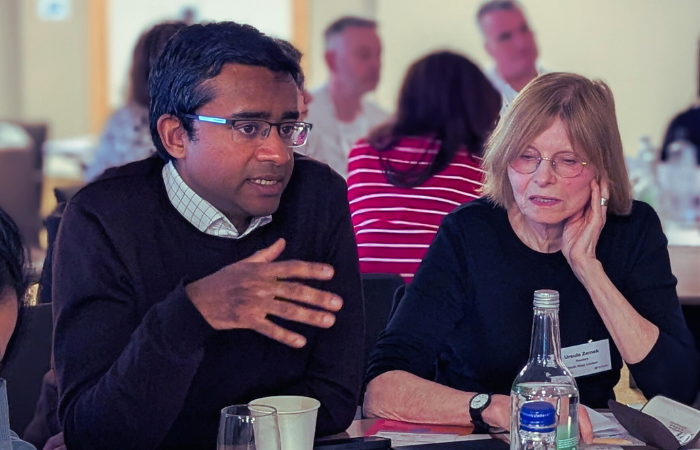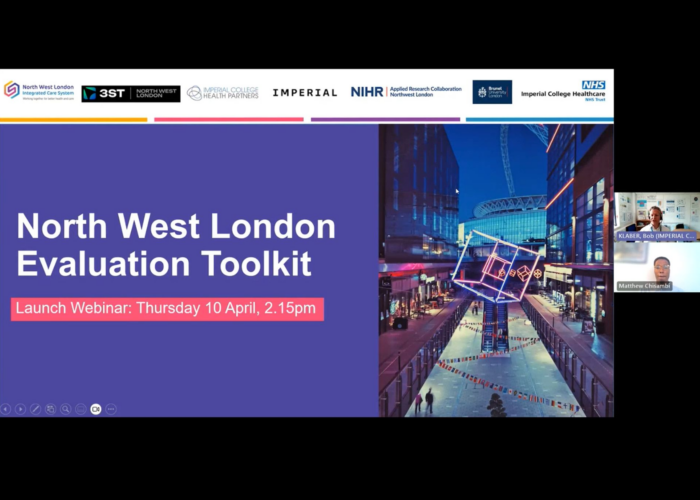By Kenny Ajayi, Associate Director of Quality Improvement and Safety, Imperial College Health Partners

Last weekend marked World Patient Safety day, a day dedicated to raise awareness globally about the dangers of medication errors and associated unsafe practices in healthcare. At ICHP, we are one of 15 AHSNs hosting Patient Safety Collaboratives, working nationally to improve outcomes on exactly these types of complex issues within our local NHS organisations.
Our Patient Safety portfolio includes priorities in medicine safety, management of deterioration, maternity and neonatal health and safety and mental health and system safety. These priorities are identified by NHS England and Improvement and change or adapt every few years. The one thing that never changes is our ICHP approach to transformation in this area, which revolves around collaboration and innovation. We create safe spaces for people – both patients and professionals – to use their experience to inform potential new ways of working. We create opportunities for the spread and adoption of new innovations or best practice and – perhaps most importantly – we create psychologically safe spaces where we can all learn from collective successes, but also learnings.
This collaborative approach takes time. But where patient safety is concerned, I will always take quality over speed. And just like the old African Proverb says, “If you want to go fast, go alone. If you want to go far, go together.”
Here are just a few of the ways in which we are ‘going together’ to improve Patient Safety across North West London. A heartfelt thank you to the Opioids Working Group clinicians, the ICB Medicines Management Team and the support of the London region Medication Safety Officer in supporting this work.
Collaboration as a means for localisation: The Medicines Polypharmacy programme
The AHSN Polypharmacy Programme aims to support local systems to reduce harm caused by problematic polypharmacy. Overprescribing is a global problem that contributes to patient harm through adverse drug reactions (someone taking more than 10 medications is 300% more likely to be admitted to hospital) as well as the cumulative burden of taking multiple medications. Further to this, in 2010 it was estimated that £300m of NHS prescribed medicines are wasted each year. This figure is thought to have now doubled.
Our work with local primary care teams involves supporting better patient-professional conversations about medicines, and shared decision-making to, where appropriate, deprescribe problematic medications. We are delivering this in partnership with North West London ICB Medicines Management Team, primary and secondary care clinicians by taking a Population Health Management (PHM) approach, reviewing local data to understand which of our patients are most at risk and then upskilling Primary Care Prescribers to train others in the deprescribing of inappropriate polypharmacy.
The value of collaboration in this way – particularly in reference to our use of both our local Whole System Integrated care (WSIC) data and the NHS Business Services Authority PolyPharmacy Dashboard – means that we can appropriately ‘localise’ our approach, and more appropriately upskill teams to focus on the groups of people who are most at risk. Taking the time to work together to better understand our local population – both through data and clinical insight through our community of practice clinicians – we can have a greater overall impact on our local population.
Collaboration as a means for setting standards of practice (not standardisation): The Medicines Safety Improvement Programme
The National Medicines Safety Programme aims to reduce the number of people prescribed opioids for more than three months by 30,000. In North West London, we are working with the ICB Opioids Working Group of multidisciplinary clinicians to engage the wider NWL clinical workforce around two approaches; Turn Off The Tap and Pull The Plug. Turn Off The Tap uses Opioid Stewardship to prevent acute use becoming chronic use, while Pull The Plug involves integrated working between PCN and Trust Pain Teams to improve pain management and offer opioid tapering programmes. Both approaches focus on collaboration across the boundaries of primary and secondary care and offer systems an opportunity to take more innovative approaches such as psychosocial offers to support patients and more integrated working to benefit patients, particularly after discharge from hospital so that acute opioid use does not become chronic use. What we aim to achieve with our collaboration around setting standard practice and procedures up is to ensure that patients get the best care, support and advice, wherever they should be accessing – be that their GP practice, the hospital Pain, Surgical or Pharmacy Teams, their local community pharmacy, or their local A&E.
Collaboration as a means for conversation
Both the above programmes of work also focus heavily on bringing the right people together – be that nationally, regionally or locally – to have open and honest conversations about where things are going well, and where there could be marked improvements. You cannot effectively advocate for best practise without addressing failings, and creating psychologically safe environments where we can share details of adverse events for everyone’s learning are an imperative part of improving patient safety. As is involving patients in these conversations. In our PolyPharmacy work, our patient focus group aims to obtain patient test and evaluate three public-facing campaigns to change public perceptions of a “pill for every ill” and encourage patients to open up about medicines.
Get in touch to find out more about any of the programmes mentioned, or our patient safety work email kenny.ajayi@imperialcollegehealthpartners.com.



